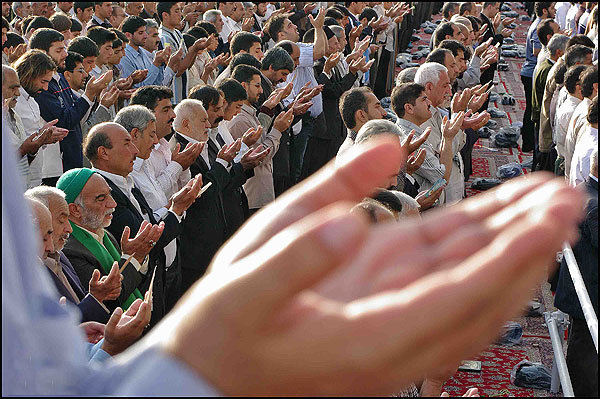Why Do We Pray Five Prayers In Three Times?
Question: What is the reason that we pray Zuhr-Asr and Maghrib-Isha prayers together, whereas for every Prayer there is a special time and the great leaders of Islam used to pray on the particular times. That is they used to pray five prayers are five different times a day?
Answer: There is no scope of argument in this matter that to establish Prayers five times a day and pray on the special times had been the practice of the Holy Prophet (s.a.w.a.), the holy Imam (a.s.) and the common Muslims at the early period of Islam and they used to generally pray five prayers at five different times.
Nothing can be said regarding this, but the argument is whether it is obligatory to keep a distance between two prayers (In the way many Mujtahids do) or it is a Recommended (mustahab) deed and is like other Recommended actions where a person has the choice to do it or not. They are not forced to pray together or separately, whether their praying of separately may be better?
The Shia scholars follow those traditions from which we come to know the actions of the Holy Prophet (s.a.w.a.) and keeping those narrations in mind which have reached us through the Holy Imams (a.s.) and following the literal meaning of the Holy Qur’an, in all the Islamic times the time gap between the two prayers is Recommended.
And told the people that to keep the time distance and to recite and pray every Prayer in its special time is better and recommended, but then also one can leave the recommended acts and the meaning of recommended is also this.
Undoubtedly by praying two Prayers together does not mean that we pray one Prayer in the time of other; for example if we pray Evening and Night prayers in the beginning of the night, it doesn’t mean that we have prayed Night at the wrong time; we have prayed both the Prayers in their proper times, because from sunset the time of both the Prayers begins till the midnight.
(Except that after sunset the time required to pray three rakat (units) is the time of Evening Prayers and in the end approximately the time required to pray four rakat is the special time of Night and the remaining time is similar for both).
And whenever we pray Night with Evening Prayers, meaning at the start of the night or pray Evening Prayer with Night Prayer at the last time of midnight, we pray both the Prayers in their specific time, but it is Recommended to pray Evening Prayer at the start of the night and Night Prayer after the time of Zawal-e-Shafaq and if a person doesn’t do like this, it means that he has just not performed a recommended act.
Why it is allowed to pray two Prayers together?
The proof regarding to pray two Prayers together is the traditions from Imam Ja’far Sadiq (a.s.) that Shaykh Hurr Al-Ameli has collected in his book.
We should also keep in mind that only Shia narrators have not only narrated traditions, but Ahle Sunnat narrators have also narrated that it is allowed to pray two Prayers together (and that also if there is no legal excuse.) They have narrated from the Holy Prophet (s.a.w.a.) in their authentic books by Ibn Abbas, Maaz Ibn Jabal, Abdullah Ibn Masood and Abdullah Ibn Umar approximately ten traditions, all of which cannot be quoted in full but we just mention some of them:
(1) The famous narrator of Sunni world, Ahmad bin Hanbal writes in his famous bookMusnad from Ibn Abbas:
“The Holy Prophet (s.a.w.a.) used to pray Noon and Afternoon Prayers, and in the same way Evening and Night Prayers without the fear of enemy or without the excuse of travel.”
(2) Then again narrates this tradition from Jabir bin Zaid who narrated from Ibn Abbas that, “I used to pray the Eight rakats of Noon and Afternoon Prayers or Seven rakats of Evening and Night Prayers together with the Holy Prophet (s.a.w.a.). And this tradition has been narrated by Ibn Abbas with different words.
(3) Again he narrates from Abdullah Shaqiq: “One day Ibn Abbas was delivering a sermon to the people and his speech was so long that the stars in the sky appeared. A man Bani Tamim tribe got up and objected to him that it was time for Evening Prayers and if the speech continues the time of Evening Prayers and if the speech continued the time of Evening Prayers will pass away.
Ibn Abbas told that person: “I know much more about traditions and practice of the Holy Prophet (s.a.w.a.) than you. I have seen that Holy Prophet (s.a.w.a.) pray Noon and Afternoon Prayers together and Evening and Night Prayers together.” The narrator says that I doubted about this and spoke to Abu Huraira who certified the saying of Ibn Abbas.
(4) The famous narrator Muslim ibn Hajjaj al-Qashiri (died in 261 Hijri) has written in his book Jama Prayers dar Huzar (to pray the two Prayers together in one’s own town) in which he has narrated four traditions from which three are from Ibn Abbas and one from Maaz ibn Jabal and the gist of the four traditions is the same as above.1
And in these traditions a new point is mentioned that when the narrator asks the reason for joining two Prayers, he answered: He (the Prophet ) did not want to put his followers into hardship.
This reason has also been narrated in Shia traditions. Traditions narrated from Imam Ja’far Sadiq (a.s.) also mention this point.2
The narrators of praying two Prayers together are not limited to Ibn Abbas and Maaz ibn Jabal only. Tibrani says Abdullah ibn Masood said that the Holy Prophet (s.a.w.a.) allowed praying Noon and Afternoon Prayers and Evening and Night Prayers together, so that the Ummat may not have to bear undue hardships.3
The same has been narrated by Abdullah ibn Zubair. He narrates that the Holy Prophet (s.a.w.a.) although he was not in traveling, prayed together so that his Ummat should not face hardship.4
This narration is from one of the many traditions of Ahle Sunnat and also in the exegesis of Qur’an that says to pray the Prayers separately is recommended and if we at any time realize that by performing this recommended itself is going to affect the performance of the worship itself then according to the guidance of the Holy Prophet we can leave it and pray two Prayers together.
Life in the present age in many parts of the world has become such that to perform this Recommended act has become difficult and many times its result is that some people are unable to perform the Prayers. In such circumstances one can take the benefit from the guidance of Holy Prophet and for performing more important work one can pray two prayers together. The view of many Sunni jurisprudents is the same, but because of some reasons, they remain away from this view.
- 1. Sahih Muslim, Vol. 2. p. 151
- 2. Wasailush Shia, Kitabus Salaat, Chapter of Time, 32, Tradition nos. 2,3,4,7.
- 3. Sharh Muwatta of Zarqani, pg. 263
- 4. Kanzul Ummal pg. 242
Philosophy of Islamic Laws:Ayatullah Naser Makarem Shirazi, Ayatullah Jafar Subhani


